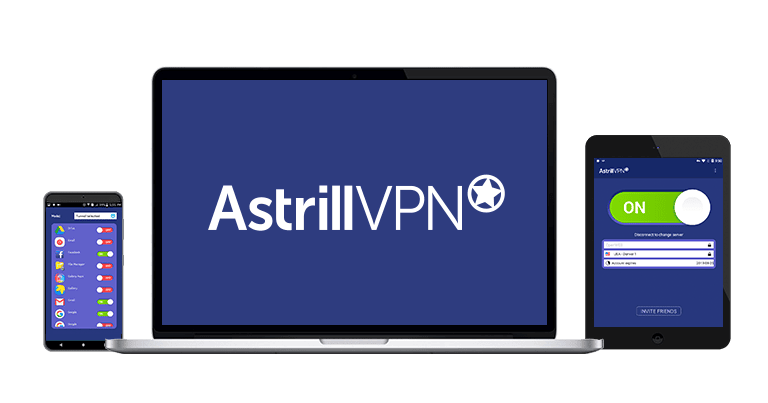
Updated on: November 7, 2024
Short on time? Here’s the best VPN for China in 2024:
- 🥇 ExpressVPN : Reliably works in China thanks to obfuscation that makes your traffic unrecognizable via deep packet inspection detection, includes industry-leading security features that work well with keyword and website blockers, and offers a list of recommended servers optimized to work in China. Its plans are affordable and backed by a 30-day money-back guarantee.
Very few VPNs work in China due to the country’s sophisticated firewall, which examines data routed in real-time and uses techniques to stop you from using a VPN. This includes blocking specific ports that VPNs use, VPN-like traffic (traffic with patterns associated with VPN protocols), VPN IP addresses, and VPN websites.
I reviewed 30+ VPNs to find ones that actually work in China. All of the VPNs that I picked for this list allow you to surf the web freely in China and have mirror links to their websites you can access from China. I think the best one is ExpressVPN, as it’s super secure, works with lots of popular streaming sites, and is the fastest VPN out there. Editors' Note: ExpressVPN and this site are in the same ownership group.
Quick Summary of the Best VPNs for China
NOTE: Using an unauthorized VPN in China may be illegal. So far, there haven’t been any recorded instances of the government punishing foreigners or individuals for using VPNs, but it’s best to be cautious. I neither encourage nor support the use of VPNs for illegal activities and would advise adherence to all local laws and regulations.
Editors' Note: Intego, Private Internet Access, CyberGhost and ExpressVPN are owned by Kape Technologies, our parent company
🥇1. ExpressVPN — Best Speeds, Security, and Reliability for Use in China
ExpressVPN is my favorite VPN for China in 2024. It works in China thanks to its obfuscated servers, which help all of your online traffic go unnoticed under DPI (Deep Packet Inspection), a form of network surveillance that the Chinese government uses to detect and block your VPN traffic. Coupled with its military-grade 256-bit AES encryption, it also works with keyword and web filters in China.
The VPN supports obfuscation on all servers and protocols, which gives you a lot of options to try if any specific combination doesn’t work. That said, a support rep told me it’s best to use the Automatic protocol setting in China.
ExpressVPN has a list of servers it recommends specifically for users in China. These servers are located in 5 locations, are optimized to work with China’s Great Firewall, and provide the best possible speeds on obfuscated connections (which are slower than regular VPN connections).
To visit the ExpressVPN site and download the VPN in China, the provider uses mirrored links, which are copies of its site that use different URLs. To get access to a mirrored link, you just have to email ExpressVPN’s excellent customer support team (24/7 live chat is available). This link also ensures you have access to customer support and your account dashboard from within China, which is important.

The VPN also comes with tons of advanced security features, including an audited no-logs policy and RAM-only servers that wipe all data every time they’re rebooted. This means the Chinese government won’t be able to get their hands on any of your location or activity data since it doesn’t exist. You also get full leak protection against WebRTC, DNS, and IPv6 leaks, so your activities will remain protected and anonymous, even if you use mobile data while in China.
ExpressVPN has secure browser extensions for Chrome (which also works on the Edge and Brave browsers) and Firefox, which you can use in China to encrypt your entire device’s traffic. I particularly like how they block HTML5 geolocation from revealing your device’s location by aligning your browser’s location data with the VPN server’s IP address, which makes it harder for your ISP in China to detect you’re using a VPN.
ExpressVPN accesses 100+ streaming sites, making it possible to securely and privately stream from China. It works with Netflix, Amazon Prime, and Disney+, as well as Max and BBC iPlayer.
ExpressVPN offers several plans that start at $4.99 / month, plus it usually includes additional free months with its longest-term plan. It accepts credit cards, PayPal, Bitcoin, and international processors including UnionPay and AliPay. ExpressVPN’s plans all come back with a 30-day money-back guarantee.
Bottom Line:
ExpressVPN works in China. It allows users to browse the web and can access popular streaming sites like Netflix thanks to its obfuscated servers that easily avoid DPI technology. ExpressVPN makes it easy to find a good connection in China, as it’s got recommended server locations that work well there, and it obfuscates all servers and protocols, so you can try lots of different combinations. ExpressVPN offers a 30-day money-back guarantee on all of its plans.
Read our full ExpressVPN review
🥈2. Private Internet Access — Great Security & Highly Customizable Apps
Private Internet Access (PIA) is secure, fast, and good for browsing the internet in China. It uses the open-source Shadowsocks obfuscation protocol to disguise your VPN traffic as regular traffic and avoid DPI detection, so you can use it in China. PIA has Shadowsocks protocols in 5+ countries, including the US, UK, the Netherlands, Switzerland, Canada, and Japan.
Additionally, PIA provides an alternative route to internet freedom in China by allowing the use of TCP port 443 with the OpenVPN protocol. This port is essential for HTTPS, so authorities can’t easily block it without disrupting widespread internet access. And I like that you can have this port enabled while connected through Shadowsocks since combining both technologies results in a more stable, reliable connection within China.
You can also generate your own configuration files and optimize connection stability and performance to use in China through PIA’s control panel. Another way to evade detection by the Great Firewall is to choose the specific server and port and connect via a direct IP address to PIA’s server — it also allows you to tweak settings like packet size for better speeds and stability while you’re in China.

PIA also has high-security features to protect your traffic and anonymity in China, like an audited no-logs policy that has been proven multiple times in court, full leak protection, and RAM-only servers.
PIA is one of the only VPNs out there that offer a Chinese IP address (through a virtual server) so you can benefit from its encryption while using local sites. The VPN also has servers in nearby locations like Hong Kong, Taiwan, and Malaysia, and in 91 countries around the world that can access 30+ streaming sites, including Netflix, Amazon Prime, and Disney.
Private Internet Access offers plans that start at just $2.19 / month. It accepts credit/debit cards, PayPal, Amazon Pay, cryptocurrencies, and even gift cards for payment in order to shield its customers’ identities. Private Internet Access covers each of their payment plans with a 30-day money-back guarantee.
Bottom Line:
Private Internet Access is a secure and highly customizable VPN to use in China. PIA’s Shadowsocks obfuscation protocol disguises your VPN traffic as regular traffic to let you browse the web in China without detection, but you can also take advantage of PIA’s customization to create your own connection for China. It can access plenty of popular streaming sites, too. All of PIA’s plans are backed with a 30-day money-back guarantee.
Read our full Private Internet Access review
Editors' Note: Private Internet Access and this site are in the same ownership group.
🥉3. PrivateVPN — Simple Interface With Good Obfuscation
PrivateVPN is pretty good at ensuring your privacy online in China. It provides an obfuscation setting known as Stealth VPN, which uses obfuscation to disguise your VPN traffic and make it look like regular traffic to China’s DPI technology.
PrivateVPN is great for both beginners and advanced users in China. For example, it’s easy to find and enable Stealth VPN — just select Advanced View (which allows you to change settings), and you’ll see Stealth VPN in the main menu. You can then switch back to Simple View, which keeps customization options to a minimum, and connect to a location.

PrivateVPN has 200+ servers in 63 countries, including Hong Kong, Japan, and Singapore, so you won’t be pressed to connect to faraway servers and deal with speeds that are too slow. It allows access to popular streaming services like Netflix and Amazon Prime, too.
PrivateVPN is also very secure. It comes with DNS and IPv6 leak protection and a no-logs policy. And in addition to a regular kill switch, it also has Application Guard, which shuts down selected apps if the VPN disconnects — I tested this feature with 3 different P2P clients, and it always worked really well.
PrivateVPN has very cheap prices that start at $2.00 / month. It offers a 30-day money-back guarantee, along with flexible payment options (including paying with cryptocurrency).
Bottom Line:
PrivateVPN has simple apps to use in China. It hides your VPN traffic from China’s Great Firewall using its proprietary Stealth VPN feature, which is very easy to enable in the app, and it has strong security features, including an app-based kill switch that works very well. Plus, it’s great for streaming from China. PrivateVPN has a 30-day money-back guarantee.
Read our full PrivateVPN review
4. Astrill VPN — Stealth VPN & Smart Mode for China’s Firewall
Astrill VPN reliably works in China thanks to its StealthVPN protocol, which hides your VPN traffic from your Chinese ISP and government. It also uses Smart Mode (in Settings), which optimizes your speed through regional IP addresses and makes sure your IP doesn’t get blocked.
Astrill VPN has Supercharged servers optimized to work in China, including in the US, Hong Kong, Japan, and more. These servers are marked in the app, so you won’t have trouble finding them, and they provide you with good speeds using obfuscation.

Astrill has servers in nearby countries, too, such as Hong Kong, Taiwan, Singapore, and Japan. Though with 105 countries, ExpressVPN offers more nearby locations for faster connections.
I also like how Astrill VPN allows you to route all of your traffic through port 433 on the OpenWeb protocol in China, in case the StealthVPN protocol doesn’t work. You can further customize your connection by sending your traffic through a specific browser if you have one that you use for uncensored browsing in China.
Astrill VPN accesses top streaming services, too. These include Netflix, Max, Disney+, and Amazon Prime.
Astrill VPN plans are expensive, starting at $12.50 / month. The VPN accepts UnionPay, PayPal, credit/debit card, and even cryptocurrencies like Bitcoin or Monero, but it doesn’t offer a money-back guarantee on any purchases.
Bottom Line:
Astrill VPN works in China because of its StealthVPN obfuscation protocol and Smart Mode, which both work to make sure all of your VPN traffic remains undetected. Astrill has optimized servers for China that offer good speeds with obfuscation, lets you customize your connections, and can access top streaming sites. Its plans are pricey, and you don’t get a money-back guarantee.
Read our full Astrill VPN review
5. TunnelBear — Great VPN for Beginners
TunnelBear is a user-friendly VPN that works very well in China. It has an easy-to-use obfuscation tool (GhostBear) that you can enable with a single click in the Settings menu under Connection, or set it to Auto, so it works automatically when needed, similar to ExpressVPN.
GhostBear makes it hard for the Chinese government’s DPI technology to detect and block your traffic. That said, it’s a shame that GhostBear isn’t available on iOS (or the latest version of the macOS app) — all of the other VPNs on this list offer obfuscation for iOS.

Its apps are very intuitive — there are explanations to help you understand and know when to use its various settings and features, plus the servers list is easy to navigate with a search bar and alphabetized list. I especially appreciate the Fastest server option, so you can easily connect to the best server for China.
TunnelBear provides pretty strong security features, including full leak protection, a no-logs policy, and an Encrypted Server Name Indication (ESNI) feature for Android. This tool encrypts the SNI field, which typically exposes the server your device intends to connect to and hides the server’s identity — so the Great Firewall won’t be able to identify and block your VPN traffic.
TunnelBear has servers in 47 countries that access services like Netflix and Amazon Prime, allowing for safe streaming from China.
TunnelBear has competitive prices (starting at $3.33 / month), but it doesn’t offer a money-back guarantee — instead, there’s a free plan with only 2 GB available per month to test out the product.
Bottom Line:
TunnelBear is very user-friendly and intuitive to use in China, making it a particularly good option for beginners. It comes with an obfuscation feature that avoids DPI technology, and good security and privacy features, as well as great streaming support. TunnelBear doesn’t offer a money-back guarantee but has a free option with a 2 GB limit per month.
Read our full TunnelBear review
Bonus. VyprVPN — Secure China VPN
VyprVPN provides strong security features so you can safely browse the web in China. It uses its proprietary Chameleon protocol that disguises OpenVPN packet metadata to evade DPI.
It combines Chameleon with Smart IP, a feature that regularly changes your IP address without disconnecting you from the VPN — this helps you avoid IP blocks in China. I like how Smart IP is automatically enabled, and you don’t have to manually turn it on.

VyprVPN has a list of servers it recommends using when in China which are optimized to work while using Chinese ISP networks. They’re located in Australia (Perth), South Korea, Japan, Los Angeles, Austin, and Hong Kong.
VyprVPN also protects your privacy while in China thanks to advanced security features like DNS leak protection and an independently audited no-logs policy. I especially like that you can set the kill switch to stay active even after closing the VyprVPN app, so you don’t accidentally go online unprotected.
It’s a decent pick for securely streaming from China. Its servers can access 45+ streaming sites, including Netflix, Amazon Prime, and DAZN.
VyprVPN’s prices start at $3.00 / month. It accepts UnionPay and AliPay and backs each purchase with a 30-day money-back guarantee.
Bottom Line:
VyprVPN is a decent option for securely browsing and streaming in China. Its Chameleon proprietary protocol masks your VPN traffic and its Smart IP tool regularly changes your IP address so the Great Firewall won’t be able to block it. VyprVPN offers a 30-day risk-free money-back guarantee with each purchase.
Quick Comparison Table
Editors' Note: Intego, Private Internet Access, CyberGhost and ExpressVPN are owned by Kape Technologies, our parent company
Testing Methodology: Comparison & Ranking Criteria
I followed our rigorous testing methodology to make sure that I only recommend VPNs that actually work in China and that they’re the best ones to use there. To do this, I ran several real-life scenario tests and evaluated each VPN’s security and user-friendliness. Here’s a detailed breakdown of the methodology I used to pick and rank the VPNs on my list:
- You can access every VPN from China via a mirror link. The VPN providers on my list have email support you can connect to get a mirror link for their website to purchase and download the VPN from China.

- I looked at security and privacy features. The VPNs on my list use military-grade 256-bit AES encryption that prevents keyword and website blocking, a kill switch that protects you from exposing your online activities to your ISP in China, and no-logs policies, ensuring it can’t share information with the Chinese government.
- I tested connection speeds: Since all VPNs impact your internet speed to some extent due to encryption and server routing, I conducted speed tests on local, nearby, and distant servers. I also tested their speeds with obfuscation enabled since this feature further slows down your speeds to make sure it wouldn’t turn your speeds into a crawl.

- I checked for user-friendliness. I tested the desktop and mobile apps for each VPN to ensure that their obfuscation features are easy to enable for anyone that wants to freely browse the web in China — some of them (like ExpressVPN) automatically turn them on when they detect a restrictive network.
- I confirmed value for money. I compared pricing plans, extra features like split-tunneling, and the number of simultaneous connections allowed. I also checked for a money-back guarantee, which allows you to try the provider risk-free.
Why You Should Use a VPN in China
China has an extremely regulated internet, so services, websites, and access to information are strictly controlled. Here are the top reasons why a VPN is essential if you’re living in or traveling to China:
Ensure Public Wi-Fi Protection
Public Wi-Fi spots, whether in cafes or airports, are often targeted by hackers. And in China, this might also include government surveillance programs trying to monitor your online behavior or infiltrate your devices. A VPN provides a secure, encrypted tunnel for your internet connection, shielding you from these cyber threats. This is particularly useful if you’re handling sensitive data or conducting important online transactions.
Free Speech
China’s tight internet regulations make it risky to voice dissenting opinions online. But with a VPN, you can mask your IP address, allowing you to express your views openly and anonymously. Your online activities get encrypted, which means you don’t have to be constantly worried about surveillance or facing repercussions for sharing your thoughts and beliefs.
Private Conversations
In China, you may have concerns about the privacy of your conversations online. A VPN encrypts your data, making it difficult for anyone (including governments and hackers) to snoop on your communications. This means you can chat, conduct VoIP calls, email, and share files without worrying too much about someone eavesdropping on you.
Download Torrented Files Safely
Torrenting and Tor networks are subject to scrutiny and restrictions in China. By hiding your real IP address, it becomes exceedingly difficult for anyone to trace your online activities back to you. This offers a layer of anonymity that can be especially valuable for downloading torrents or accessing restricted networks.
Stream Securely
VPNs can change your IP address, making it possible to access top streaming services like Netflix from China. Since they encrypt your traffic and those that work in China also obfuscate it, streaming with a VPN from China is very secure and private.
VPN Not Working in China? Try These Troubleshooting Tips
Wait for the VPN Connection to Be Established
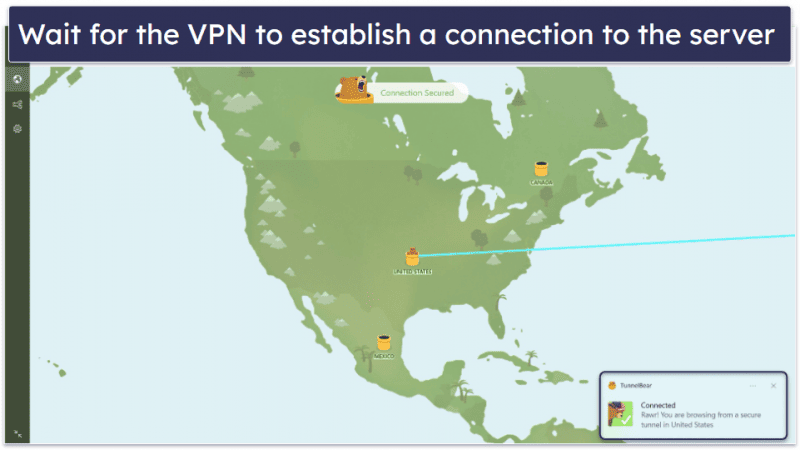
It typically takes around 2–3 seconds for the VPN to establish a connection to the server, but if your speeds in China are slower, you may have to wait for 30–60 seconds for your VPN to establish a connection.
Make Sure You Have the Obfuscation Feature Enabled

Different VPNs use different obfuscation features. Some, like ExpressVPN, automatically obfuscate your servers when they detect VPN blocks and restrictions. With others, however, you have to find the feature that obfuscates your traffic and enable it. Most VPNs also require you to use the OpenVPN protocol for the obfuscation to work.
Switch to Recommended Servers
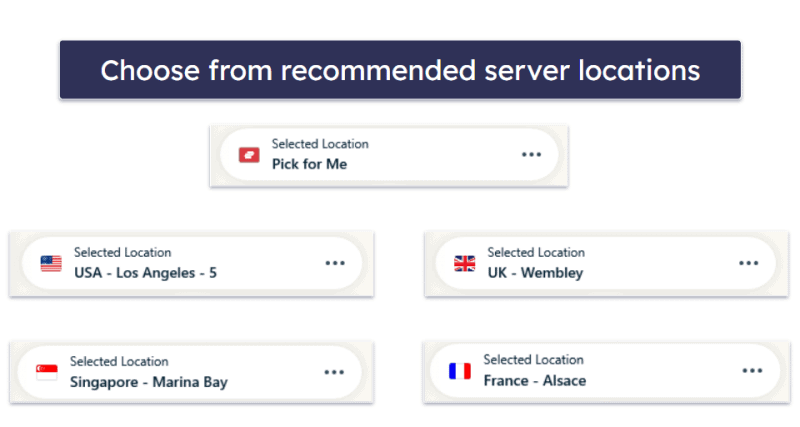
Some VPNs have recommended servers for China, which are optimized for reliability and speed. While specifics may vary, most VPN providers offer similar recommendations or have servers that perform well in restrictive regions.
Secure a New IP Address
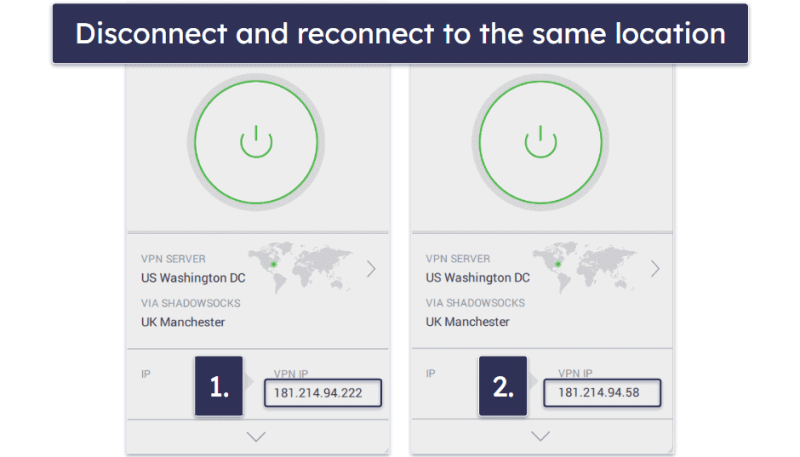
If you’re encountering blocks, it might be due to China’s firewall targeting the VPN’s IP address you’re using. Reconnecting to your VPN can assign you a new IP, often circumventing the immediate block.
Note that you may need to attempt multiple connections or switch between different servers to find one that works.
Consider Using OpenVPN TCP Protocol
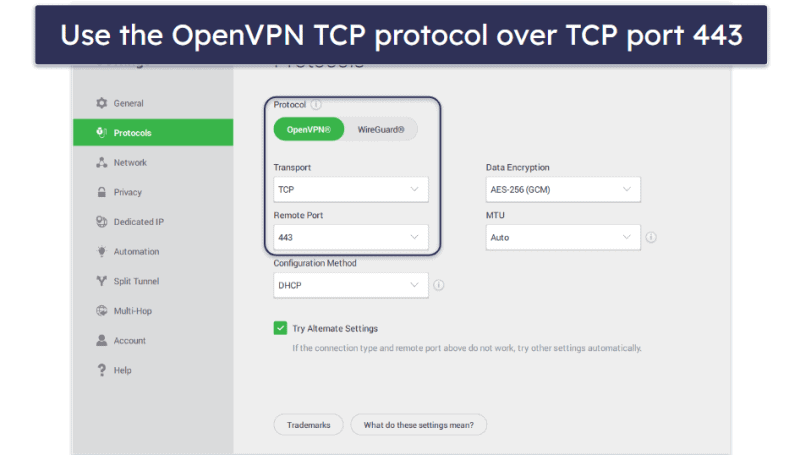
Using the OpenVPN TCP protocol over TCP port 443 makes it less likely for ISPs in China to block your VPN traffic. This port is used for secure HTTPS web traffic, which is essential for most online services, and blocking it would mean no Chinese internet users could access Chinese sites that use HTTPS.
Check the Kill Switch and Leak Protection Settings
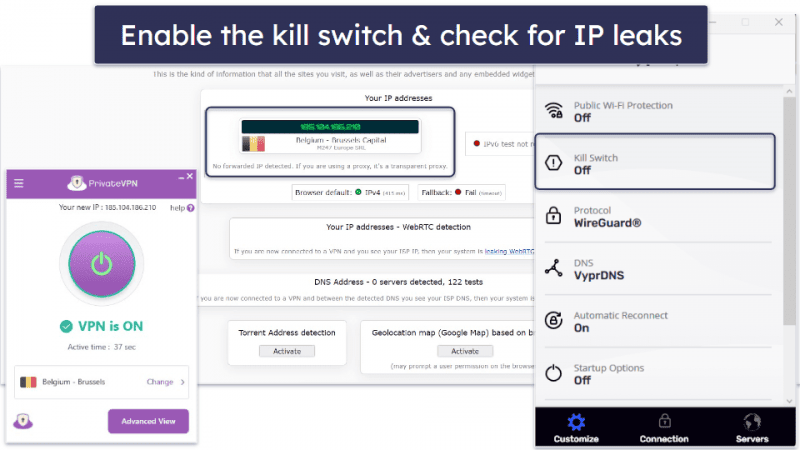
Make sure that your VPN’s kill switch and DNS/IPv6 leak protection features are enabled. The kill switch halts all internet traffic if your VPN connection drops, avoiding any data leaks. DNS/IPv6 leak protection ensures that even during connection issues, your device doesn’t default to using your real, Chinese IP address for DNS requests.
Clear Your Browser’s Cache and Cookies
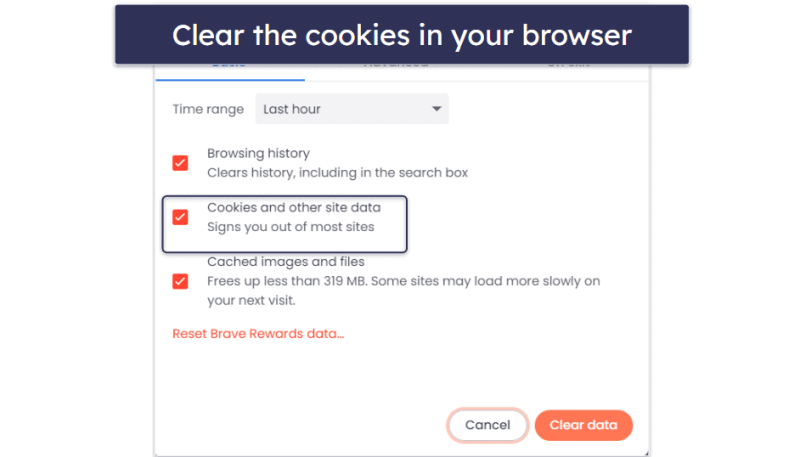
Websites can use your cache and cookies to detect your actual location, potentially overriding your VPN. Clearing these before connecting to the VPN can help keep your real location hidden.
Reach Out to Customer Support
If all else fails, contact your VPN’s customer support. If your VPN’s site is blocked and you can’t reach out to the live chat reps, you can contact them via email. All of the VPNs I recommend here provide email support and have knowledgeable reps.
Top Brands that Didn’t Make the Cut:
- IPVanish. IPVanish is a useful VPN for torrenting and gaming, but it doesn’t work in China.
- CyberGhost VPN. CyberGhost VPN is a great, easy-to-use VPN with specialized torrenting and gaming servers. It even has servers in China, but it only maybe works in that country.
- Proton VPN. Proton VPN is an excellent VPN option with high-privacy features. However, even though the VPN provides obfuscation, there’s no guarantee it works in China.
Frequently Asked Questions
Do VPNs work in China?
Most VPNs don’t work in China. This is because the Chinese government has banned all unapproved VPNs and made a strong effort to block their traffic.
Government-approved VPNs are not great for security, however, as they are forced to give the government backdoor access. Fortunately, there are still some secure VPNs that work in the country, such as ExpressVPN (confirmed by customer support representatives). It also provides blazing-fast speeds and has excellent privacy and security features, making it the #1 VPN for China.
What is the best VPN for China?
ExpressVPN is my top pick for bypassing China’s firewall in 2024. It works well in China, it’s fast, it comes with excellent security features, and it has a very user-friendly interface.
How do I use a VPN in China?
Bypassing China’s firewall with a VPN requires only 3 steps:
- 1. Get a reputable VPN before traveling to China. I recommend ExpressVPN because it has strong security, the fastest speeds on the market, and very intuitive apps.
- 2. Download and install the VPN. This process should only take a few minutes — just follow the installation wizard’s instructions.
- 3. Connect to a server. Open the app and select a nearby server for the fastest possible speeds. That’s it! You can now freely and securely browse the web in China.
Can I use a free VPN for China?
China’s firewall blocks most free VPNs — so you’ll probably need a paid VPN service for the fastest and most reliable browsing. While some VPNs may offer a free plan that works in China, most have slower speeds and set a limit on your bandwidth.
The best option is to purchase a reasonably-priced VPN that will allow you to safely and securely browse the web in China with no restrictions. My top recommendation is ExpressVPN since it works in China, provides very fast speeds, and is ultra secure.
Which country should I connect to in China?
It’s typically best to connect to a server in a nearby country, such as Japan or Singapore, as you’ll get the fastest possible speeds. That said, some VPNs have special server locations optimized to work well in China, and if your provider has a list of these, it’s best to try them first. If your VPN is not working properly, follow these troubleshooting steps.
Is it legal to use a VPN in China?
The legality of VPNs in China is a legally gray area. Technically, China only allows using authorized VPNs — all of these VPNs have agreed to share user data with the Chinese government, so they won’t protect your privacy like the VPNs I recommend here. Also, many of these VPNs have to follow the restrictions set out by the Chinese government, so you won’t get access to the free web.
Authorities in China mostly target individuals that share unauthorized VPN and not those who use VPNs to get around restrictions. However, it’s crucial to stay informed about the current regulations and exercise caution, understanding the risks involved in using VPNs not sanctioned by the government.
Can I download a VPN in China?
Yes, but you’ll have to jump through hoops. Many VPN providers’ websites are blocked in China, making it difficult to download VPN apps directly once you’re in the country. This is why it’s best to download and set up your VPN before you visit China.
If you’re already in China without a VPN, some workarounds to get a VPN include using a mirror site, which you can get by emailing your VPN provider, or asking someone outside of China to send you the VPN installer via email or a cloud-sharing service.

